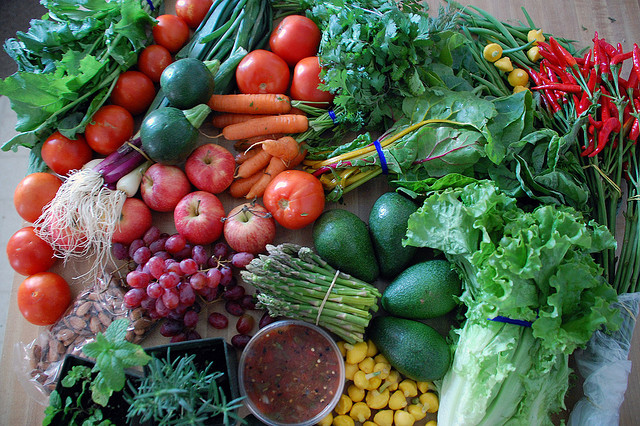You've come home with a ton of produce from your local farmer’s market, but how should you store it? Does it stay on the counter or does it go in your refrigerator? Doesn’t it seem like fruits and veggies just go bad without even having a chance to eat or cook them? It’s disappointing, really. Although, you can recycle your produce and toss it in your compost pile, but that doesn’t solve the problem of properly storing your fresh food. While it is common to know where some fruits and veggies go (keep those bananas on the counter!), we have come up with a few tips to keep your beautiful produce fresh and longer.
Refrigerator: Tip: Line your veggie crispers in paper towels or place an ethylene absorber in each of the bins. Why? Some fruits and veggies emit a chemical called ethylene that causes other produce items to ripen and rot very quickly. The produce that emits this chemical gas are: apples, apricots, cantaloupe, bananas, tomatoes, figs, honeydew, avocados, nectarines, peaches, pears and plums. You should store these items in a bag with holes poked throughout it as well as separating items to reduce spoilage. Fruits-
- Your fruits should be stored in a separate bin from your veggies with low humidity.
- The following fruits should be stored in your fridge: cantaloupe, honeydew, figs, apricots, all types of berries, cherries, grapes and plums.
Vegetables-
- Your veggies ultimately should be stored in a bin with a high humidity in your fridge.The crisper keeps the moisture in, helping to eliminate water loss from your veggies.
- Celery, leafy greens, broccoli, carrots, lettuce, peas, radishes, corn, cauliflower, artichokes, lima beans, beets, green beans, brussel sprouts, radishes, green onions, summer/yellow squash, leeks and sprouts should be kept inside of your refrigerator.
Countertops:
Fruits-
- These following fruits will continue to mature and can be left out on your countertops: mangoes, citrus fruits, watermelons, pomegranates, plantains, bananas and kiwi.
- Allow for avocados, nectarines, peaches and plums to ripen on the counter. As soon as they’re soft, stick them right in the refrigerator to slow down the spoilage time.
Vegetables-
- Keep these veggies on the counter: cucumbers, eggplants, tomatoes and peppers.
Cabinet:
- The following produce should be stored in a dark, cool place like your cabinet, like with like and not together. You want to create a similar environment like the ones they grew in—dark, cool soil.
- This includes: potatoes, onions, garlic, acorn squash, pumpkin, butternut squash, sweet potatoes and winter squash.
Have you been storing your produce correctly or incorrectly? The way you store food changes the taste and texture. Go ahead and give these tips a try and see if you can taste the difference--and reduce food waste while you're ahead!
Photo by: Peyri Herrera | Flickr





